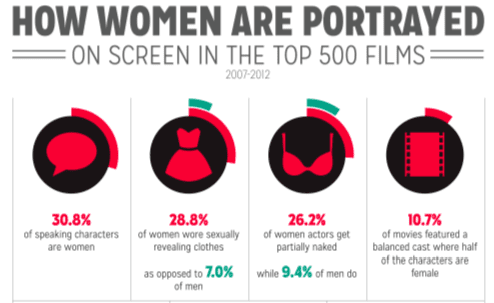Female-driven productions and the representation of women may be a popular conversation topic right now but when it comes to the way women are represented and seen on-screen, we are nowhere near gender equality. For every five men working behind the scenes, there is just one woman. Women continue to be woefully underrepresented and misrepresented on screen.
Recent data from The Geena Davis Institute on Gender in Media, which analyses female representation on-screen (and the lack of), found that out of 1,565 content creators, only 7% of directors, 13% of writers and 20% of producers of recent productions were females.
The lack of female representation has a more widespread effect than just a lack of diversity in what we see (or don’t see) on our screens. As Geena Davis, actress and founder of the Institute on Gender in Media, wrote for The Hollywood Reporter in December last year:
“We are in effect enculturating kids from the very beginning to see women and girls as not taking up half of the space. Couldn’t it be that the percentage of women in leadership positions in many areas of society — Congress, law partners, Fortune 500 board members, military officers, tenured professors and many more — stall out at around 17% because that’s the ratio we’ve come to see as the norm?”

Another study released by The Journal of Management Inquiry earlier this year found that an actress’ salary plummets after she hits the age of 34, while male actors’ salaries increased until they reached 51, at which point their salaries stabilised.
It means even minor progress for women on-screen is welcome and cause for celebration. And this week there is plenty to celebrate as a number of organisations have separately announced they are taking steps to improve the representation of women in media.
The head of BBC television, Danny Cohen, announced the British broadcaster will ban all-male comic panels and will insist that at least one woman is included in every panel line-up.
Cohen said that broadcasting a program without a women on the panel was “not acceptable any longer”, following recommendations from BBC Trust who last year tasked management with putting more women on screen as a “matter of urgency”.
BBC’s entertainment controller, Mark Linsey, has told program-makers there is “just no excuse for delivering all-male guest lists”, after a number of their programs were derided for not having any female panelists.
And no-doubt inspired by the recent success of female-driven comedies, including The Heat and Bridesmaids, Will Ferrell’s production company, Gary Sanchez, is taking steps to make women more visible in Hollywood, forming a new female-driven division of their production company dubbed Gloria Sanchez productions. The venture will focus on creating female-led film and TV projects and will be headed up by Jessica Elbaum who is currently an executive at Gary Sanchez.
“When Jessica came to us with this idea, we thought it was fantastic,” Ferrell and McKay said in a joint statement. “She has worked with some of the great female voices in comedy and has proven herself as a gifted producer who has a keen eye for material.”
Then there’s news that Sheryl Sandberg’s Lean In, an organisation changing the way we talk about female corporate leaders, is tackling institutionalised sexism in the most unlikely medium: stock photos.
The Lean In organisation has partnered with Getty Images to create the ‘Lean In Collection’, a stock image library of 2,500 pictures that seeks to change the way women are represented in images used by media outlets. ( It is also provide comforting assurance that women will never have to laugh alone with salad again.)
“The notion behind the partnership is that a sizable share of results that come up in routine stock-photo queries for terms like “businesswoman” and “career woman” are “completely sexualized or just really cheesy,” said Jessica Bennett, Lean In’s contributing editor.
Pam Grossman, director of visual trends at Getty, commissioned a study to track the changes in representation of women and later shared her findings with Lean In and said she hoped that by showing powerful images of women “we thought maybe we could actually change the world”.
You can check out the full collection of Lean In images here.





